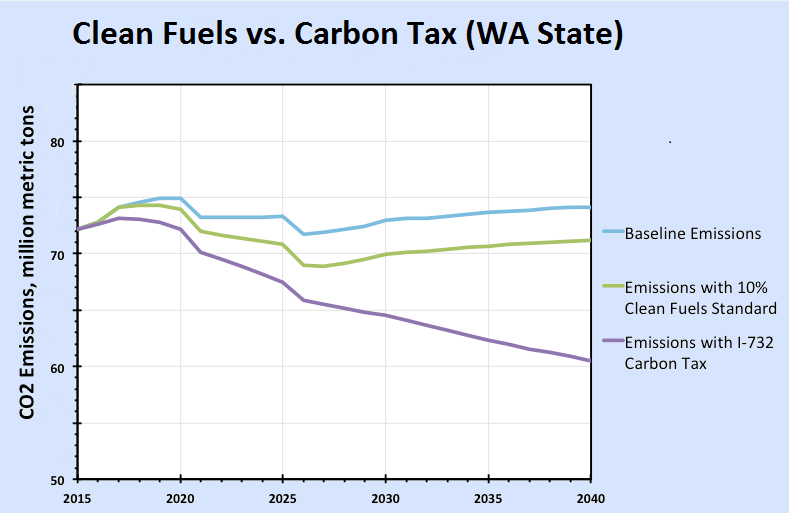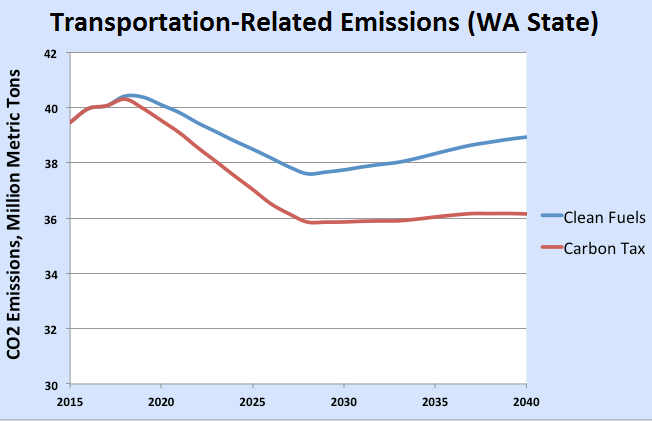Even in ecologically-minded Washington and Oregon, states where voters want government action on climate change, a divide among environmentalists threatens to undermine progress on the issue. A Carbon Washington ballot initiative to create a statewide carbon tax is gaining momentum, as we wrote last month. Yet several environmental groups are attacking the proposal as politically infeasible and socially regressive.
Instead, state and regional groups like Climate Solutions and the Alliance for Jobs and Clean Energy are pushing “clean” fuels standards. Their proposal, patterned on regulations in California and British Columbia, would mandate a mere 10% drop in the carbon intensity of transportation fuels over 10 years ― a small fraction of the deep reductions needed.

The carbon tax sought by Carbon Washington would cut CO2 4-5 times as much as the proposed WA Clean Fuels Standard (Source: CTAM).
Their course is difficult to fathom. Carbon taxes would cut emissions more and cost less than clean fuels regulations. And dividing environmentalists in order to pursue a lesser policy makes no sense strategically. Here are three reasons why a clean fuels standard doesn’t stack up:
1. Clean fuels standards won’t be effective
A model used by the Washington State Department of Commerce allows us to compare projected emissions reductions from the clean fuels standard with the carbon tax proposed by Carbon Washington in a measure known as I-732. (The tax would start at $10/ton of CO2, rise to $25 in year two, then increase 3.5% annually plus inflation.)
The 10% clean fuels standard would lower overall Washington CO2 emissions only 4% by 2040, not even a quarter as much as the 18% reduction projected from the I-732 carbon tax.
The reason is simple: a clean fuels standard only attacks emissions from the supply side of one sector, albeit an important one, transportation. In contrast, a carbon tax works across the entire economy, influencing every carbon-related decision about both supply and demand in every sector ― manufacturing, heating, electricity, etc. This means that, while a clean fuels standard only affects the carbon content of liquid fuels, a carbon tax also incentivizes less fuel usage, period. This transforms economies, cutting pollution and congestion through a vast array of actions encompassing urban density, freight logistics, walking, cycling, transit, and more mindful decision making.
 In short, the difference in emissions between a carbon tax and a clean fuels standard is the difference between a society that takes current levels of automobile dependence as a given, and one that seeks to support a myriad of ways to transition to something different.
In short, the difference in emissions between a carbon tax and a clean fuels standard is the difference between a society that takes current levels of automobile dependence as a given, and one that seeks to support a myriad of ways to transition to something different.
2. Clean fuels standards are more expensive
The Oregon Environmental Council writes:
The Clean Fuels Program costs the state virtually nothing. The burden of responsibility for reducing pollution is placed on the oil industry.
This conspicuously ignores how the oil industry passes down its costs of compliance to consumers in the form of higher prices. The Oregon Department of Environmental Quality (DEQ) has said gas prices will rise between 4 and 19 cents per gallon. An industry lobby group, the Western States Petroleum Association, is garnering support to repeal clean fuels by highlighting this not-so-hidden price increase.
Consumers aren’t stupid, they generally realize more regulations mean higher prices. A carbon tax raises fossil fuel prices too, of course ― that’s the point; but the revenue it generates can be disbursed to consumers as income or sales tax cuts, or via a straight-up “dividend” check, as Oregon Climate has proposed.
Hypocritically, Washington State groups lobbying for clean fuels have attacked the I-732 carbon tax as regressive. Yet Carbon Washington’s proposed dividend payments to low-income households would more than offset the burden of the tax. In direct contrast, fuel price increases from the proposed Washington clean fuels standard will disproportionately burden low-income households while subsidizing electric vehicles, an indulgence for wealthier individuals.
3. Clean fuels standards aren’t politically strategic
The passage of Oregon’s 2015 clean fuels standard was a bit of déjà vu for activists who remember passage of the same law in 2008. The law languished unimplemented for seven years in Oregon’s DEQ, and when it expired this year, advocates were forced to fight for an extension.
Yet backers of Oregon’s clean fuel standard insist it is strategically preferable to anything called a ‘tax.’ In their view, regulations will always be more popular (or at least less unpopular) with the electorate. Presenting the measure as a mandate for corporations (“just make them cut emissions”) will help obscure the fact that the costs of implementation are passed down to consumers. But Kristin Eberhardt, an analyst for the Sightline Institute, brilliantly articulates why regulatory limits on carbon contents often fail in practice:
Unfortunately, “just make them” is not an elegant picture. The authorities in charge of “making them” would be state agencies, but clashing jurisdictions, inadequate legal tools, administrative silos, and potentially perverse incentives across economic sectors make a purely regulatory approach to carbon limits a fourth or fifth or tenth best approach.
This is precisely what happened with Oregon DEQ. In seven years, the agency couldn’t devise a way to enforce the legislated clean fuels mandate. The process was subject to intense political pressures, including a threat to withhold agency funding.
Even now with the new bill’s passage, Clean Fuels’ future in Oregon is far from assured. The Western States Petroleum Association is bringing lawsuits against the new incarnation of the bill and challenging it at the ballot in 2016. All the resources the environmental organizations are spending on opposing the lawsuits and organizing against the ballot initiative to repeal the legislation (not to mention lobbying the legislature – twice) could have been used instead to educate and organize around the tax, which could have been implemented immediately without being derailed by lawsuits.
We still don’t know if or when an Oregon clean fuels standard will come into effect. In contrast, British Columbia announced a carbon tax in 2008 and implemented it that same year with little administrative burden. In the seven years since, it has far surpassed the percentage emissions reductions a clean fuels standard would achieve over its lifetime in Oregon.
It would be one thing if groups like Climate Solutions or the Alliance for Jobs and Clean Energy supported both Clean Fuels and a carbon tax. But a former CS director reported that these “political professionals are trying to strangle the [carbon tax] in its crib before it can gain substantial momentum.” Soon after the launch of the Washington State ballot initiative, CS sent out an email to its supporters stating they would not be supporting it. Although their policy director wrote me, “It’d be a shame to present this as the community divided,” CS’s coalition partners have attacked the carbon tax in the press and spread rumors of poor polling performance without releasing the polls.
Clean Fuels doesn’t match up with taxing carbon pollution in effectiveness, equity, or reliability. Moreover, Climate Solutions’ inability to deliver on a heavily compromised Washington State cap-and-trade bill last year belies its demand to ‘trust us’ on policy and strategy (the bill exempted the state’s only coal plant). Meanwhile Carbon Washington has gathered 100,000 signatures in support of I-732. Climate Solutions’ help would virtually guarantee that the carbon tax could get on the ballot in 2016, though that may happen even without their support.

Topman Promo Code
Clean Fuels vs. Carbon Tax in the Pacific Northwest